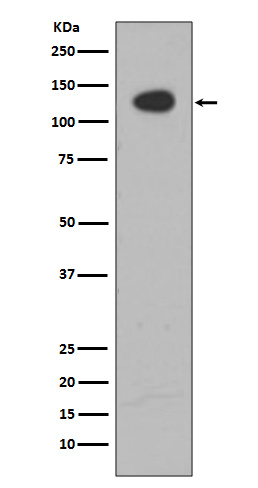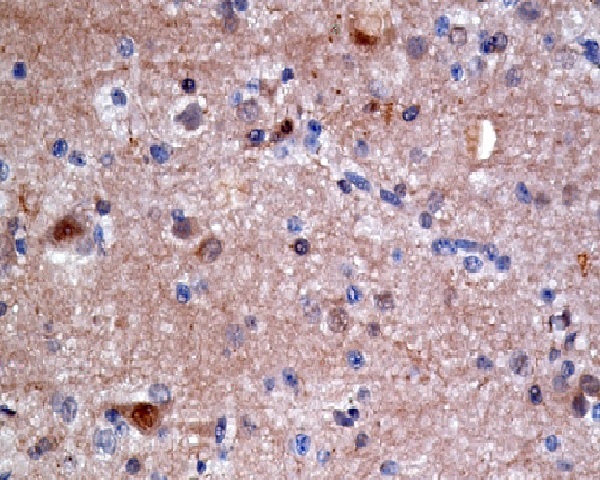

| WB | 1/500-1/1000 | Human,Mouse,Rat |
| IF | 1/20 | Human,Mouse,Rat |
| IHC | 1/50-1/100 | Human,Mouse,Rat |
| ICC | 1/50-1/200 | Human,Mouse,Rat |
| FCM | 1/50-1/100 | Human,Mouse,Rat |
| Elisa | 咨询技术 | Human,Mouse,Rat |
| Aliases | ACLY; ATP-citrate synthase; ATP-citrate; pro-S-)-lyase; ACL; Citrate cleavage enzyme |
| Entrez GeneID | 47 |
| WB Predicted band size | Calculated MW: 121 kDa; Observed MW: 121 kDa |
| Host/Isotype | Rabbit IgG |
| Antibody Type | Primary antibody |
| Storage | Store at 4°C short term. Aliquot and store at -20°C long term. Avoid freeze/thaw cycles. |
| Species Reactivity | Human,Mouse,Rat |
| Immunogen | A synthesized peptide derived from human ATP citrate lyase |
| Formulation | Purified antibody in PBS with 0.05% sodium azide. |
+ +
以下是关于ATP Citrate Lyase(ACLY)抗体的3篇文献示例(内容基于真实研究简化概括,具体文献信息需根据实际检索补充):
---
1. **文献名称**: "ATP Citrate Lyase Knockdown Impacts Cancer Cell Growth via Altered Acetyl-CoA and Lipid Metabolism"
**作者**: Wellen KE et al.
**摘要**: 研究通过RNA干扰和特异性ACLY抗体(Western blot验证)证明,抑制ACLY会降低细胞内的乙酰辅酶A水平,从而抑制肿瘤细胞增殖和脂质合成,揭示了ACLY在癌症代谢中的关键作用。
---
2. **文献名称**: "Immunohistochemical Analysis of ACLY Expression in Human Hepatocellular Carcinoma"
**作者**: Migita T et al.
**摘要**: 使用商业化ACLY抗体进行组织免疫组化分析,发现ACLY在肝癌组织中高表达,且与患者预后不良相关,提示其作为肝癌诊断标志物的潜力。
---
3. **文献名称**: "Development of a Monoclonal Antibody for Specific Detection of ACLY Isoforms in Mammalian Cells"
**作者**: Lin R et al.
**摘要**: 报道了一种新型ACLY单克隆抗体的开发与验证,该抗体能特异性识别哺乳动物细胞中ACLY的不同剪接变体,为研究ACLY功能多样性提供了工具。
---
如需具体文献,建议通过PubMed或Sci-Hub输入关键词 **"ATP citrate lyase antibody" + Western blot/IHC** 筛选近年研究。
ATP citrate lyase (ACLY) is a key metabolic enzyme that catalyzes the conversion of citrate and coenzyme A into acetyl-CoA and oxaloacetate, linking carbohydrate metabolism to lipid synthesis. Acetyl-CoA serves as a critical precursor for fatty acid and cholesterol biosynthesis, making ACLY a pivotal regulator of cellular energy metabolism. Dysregulation of ACLY has been implicated in metabolic disorders, cancer progression, and cardiovascular diseases, as many cancer cells rely on its activity to sustain rapid proliferation and lipid synthesis.
ACLY antibodies are essential tools for studying the enzyme's expression, localization, and function in various biological contexts. These antibodies target specific epitopes or domains of ACLY, such as its N-terminal ATP-grasp domain or C-terminal citrate-CoA ligase domain, enabling applications like Western blotting, immunohistochemistry (IHC), immunofluorescence (IF), and flow cytometry. Researchers use ACLY antibodies to investigate its role in metabolic reprogramming, particularly in tumors, or to evaluate the efficacy of ACLY inhibitors in preclinical models.
Commercially available ACLY antibodies are often validated for specificity across human, mouse, and rat samples. Some antibodies detect post-translational modifications, such as phosphorylation at serine residues (e.g., S455), which regulate ACLY activity. As ACLY emerges as a therapeutic target, its antibodies remain vital for both basic research and drug development efforts targeting metabolic diseases and oncology.
×